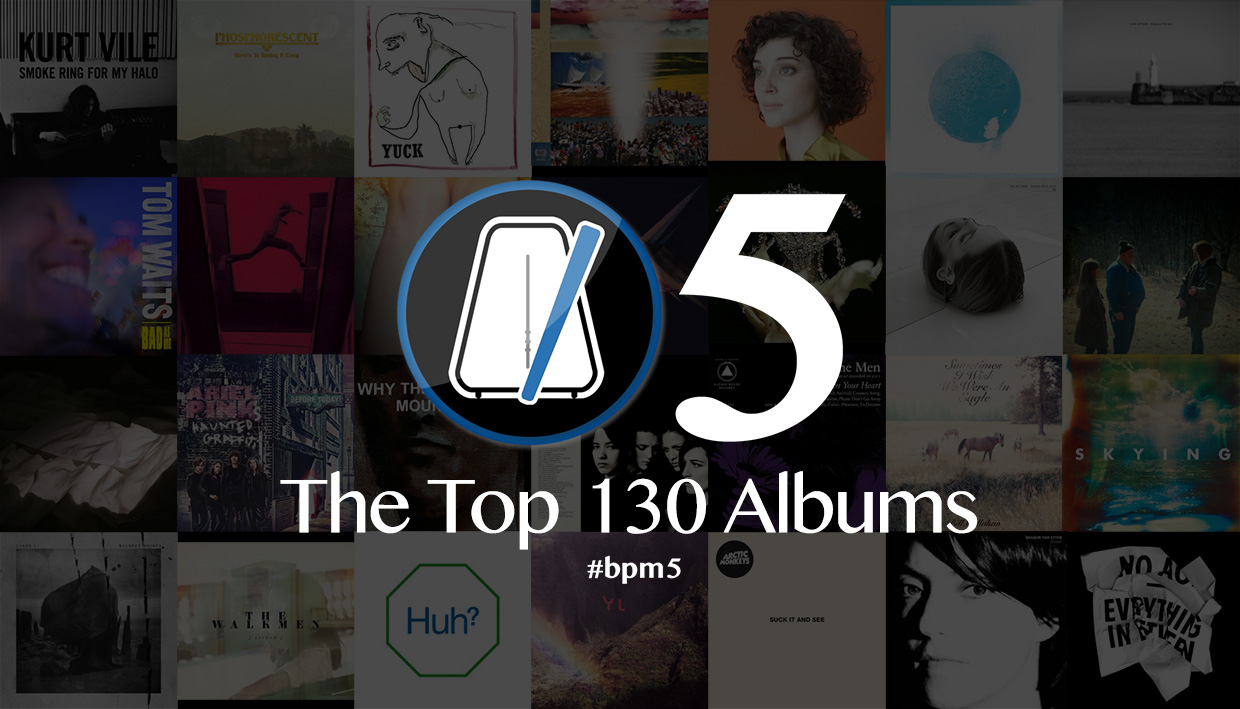
110
Cymbals Eat Guitars
Why There Are Mountains
[Self-released/Sister’s Den; 2009]
They say you have your lifetime to write your first album, but in the case of Cymbals Eat Guitars’ lead singer Joe D’Agostino this was especially true; not only were the ideas for the songs germinating in his head for years but the sequencing and overall flow and concepts were there too. This gives Why There Are Mountains an unlikely feeling of completeness for a debut album. D’Agostino is somewhere between Bradford Cox and Isaac Brock, both aurally and lyrically, though you’ll have to strain hard to catch everything he’s saying as the quick-hitting pace of his imagery is matched by the fluidly rumbling, directionally shifting and seismically bursting songs that the foursome have created together. Through nods to 90s alt-rock greats like Pavement, Modest Mouse and Built To Spill, Why There Are Mountains is a tapestry of guitars explosions and effects, waves of keyboards and terrifying shrieks from D’Agostino that all together builds up to a spectacle worthy of its lofty title.
– Rob Hakimian
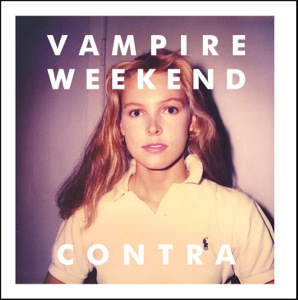
109
Vampire Weekend
Contra
[XL; 2010]
At this point in time, Contra is going down as the worst Vampire Weekend record. Considering the modern classics that flank either side it’s a fair indictment, but deserves more than that. You’d imagine there wouldn’t be many complaints amongst 99% of indie shallow-enders if an offer arose to jack in the band just to have “Giving Up The Gun” resting on the mantlepiece. The album has proved durable, faring better now than upon release at the beginning of 2010. There it appeared to be a case of slightly diminished returns, packed full of witty, enjoyable tunes but lacking a certain spark. It seems as if the sly Columbia gents had a gameplan after all: given that “Run” acts as a prequel to “Hannah Hunt,” and “California English” works as an extension of the literary themes played out to perfection on “Oxford Comma,” Contra can be seen as a stepping stone. Caught in between boundless exuberance and matured refinement, this is the sound of a band aware of its own prowess, tactically constructing a narrative arc and, in doing so, proving that taking bronze in an extraordinarily strong field is no bad thing.
– Gabriel Szatan
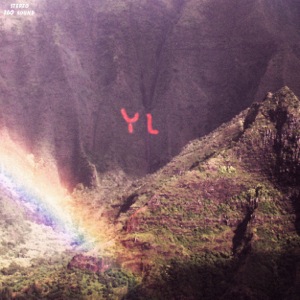
108
Youth Lagoon
The Year Of Hibernation
[Fat Possum; 2011]
Purpose built for those hazy afternoons that seem to go on forever, lying in bed as the sun filters through yonder curtains and naïvely skipping through fields of gold on the outskirts of Paris or some shit, The Year Of Hibernation could be a jump-off point for fey bedroom twee pop, were it not executed so well. Reverb’d to heaven/hell (depending on preference), the music Youth Lagoon put out on his debut is unquestionably of a fashion, but trades on an astute knowledge of song construction instead of letting the effects do the talking: drums shuffle forward with determination, brisk snares shaking the morning dew; the yearning wails never feel forced; the additional ivory-tickling and xylophone-tinkling compliment the hopeful nature of the songs. Little flourishes from track to track begin to worm their way into your head – the quasi-Gaelic tone underlaying “17,” the stirring whistling on “Montana” and the soft cresting of…well, pretty much every track to be fair. A victory for strong but silent types the world over.
– Gabriel Szatan
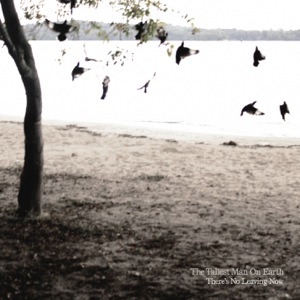
107
The Tallest Man On Earth
There’s No Leaving Now
[Dead Oceans; 2012]
From the title to the cover art which, while still as beautiful as those of his previous LPs, depicts something more grounded and less expansive, The Tallest Man On Earth’s Third album There’s No Leaving Now finds him tackling subjects a lot closer to home. Whereas on previous releases he seemed like a fearless cavorter around the world, willing to fight and argue with everyone, There’s No Leaving Now exposed his more personal fears and loves. “Leading Me Now” tells of a heartbreaking on again, off again relationship, “Little Brother” reprimands someone close to him (or possibly himself) for too much drinking and thinking, and then there’s the beautiful resignation of the title track. There are plenty more tales to be parsed from his evocative lyrical descriptions, using natural entities as forever beguiling metaphors. This, combined with an ever-improving voice and a more melodical use of the acoustic guitar, makes There’s No Leaving Now arguably Kristian Matsson’s most heartwarming release to date.
– Rob Hakimian

106
Gang Gang Dance
Eye Contact
[4AD; 2011]
I like to think there’s a parallel universe where Gang Gang Dance’s brand of alien pop is topping the charts. It’s all here: major-key immediacy, melodic escapism, a charismatic frontwoman, danceability – so what if Eye Contact‘s lead-single was almost twelve minutes long? That’s three radio-ready songs for the price of one! Alas…
The group named this, their fifth album, Eye Contact to differentiate their mode of delivery from previous outings. Not that the music here isn’t improvised and long-form. “Glass Jar” spends the majority of its eleven and half minutes building layers of tropical, cosmic synths toward its motorik descent. And there’s no doubt Gang Gang Dance is still heavily indebted to pop music from abroad. But the sound on Eye Contact is without psychedelic ambiguity while still managing vivid technicolor imagination. The richly melodic, and surprisingly complex, arrangements led by Lizzi Bougatsos’ angelic vocal energy give rise to an aggressively creative and joyfully unpredictable forty-eight minutes. Its urgent hook-after-hook sense of immediacy on songs like “Chinese High” and “MindKilla” would be goddamn overbearing if not for the tonal diversity on display with tracks like the foreboding “Adult Goth” or psych funk slow jam, “Romance Layers.”
– Will Ryan

105
Actress
R.I.P.
[Honest John; 2012]
Actress – aka producer Darren Cunningham – has spent the majority of his career making music that shies away from the dancefloor. Where most producers focus their attention around the manipulation and reconstruction of beats, Cunningham instead works in vagaries and rhythmic subterfuge. On R.I.P., his third LP, he drops the beats almost entirely to highlight the sense of negative space within his compositions. Combining aspects of ambient music with minimalist techno filaments, the songs come across as works of skeletal atmospherics, with Cunningham barely holding the sounds together in any discernible shape. But that aspect is also part of the record’s appeal; R.I.P. feels like it might dissolve at the slightest touch, as if he approached William Basinski’s The Disintegration Loops from a more dynamic perspective.
But Actress isn’t merely the outlet for Cunningham to spout off a laundry list of influences, and this album isn’t simply the conveyance for those ideas. It’s a progressive step forward in electronic music, where the norms and traditions are thoughtfully upheld while still allowing for radical redesign and evolution. Whether he’ll continue down this non-linear path on future releases remains to be seen, though I doubt anyone would be upset if he chose to do just that.
– Josh Pickard

104
Los Campesinos!
Romance Is Boring
[Wichita; 2010]
Romance is Boring is the result of a band growing up. The depature of Aleks and Ollie soon after the album was completed to be replaced by Kim and Rob suggested a band that was going through a transition and the album seemed a precursor to the later events. Gone were the light, slightly nonsensical lyrics of their debut. In their place was a grim, cynical look at the human condition fleshed out by Gareth’s dark British Humor. Gareth had always been good with wordplay but it was on this album that he really came into his own, adding meaning to his clever lines. The desperate snarls of “Plan A” and heavy subject matter of “The Sea Is A Good Place To Think Of The Future” may not have fit on their earlier works but it felt like a natural progression of a growing band. One of my favorite albums from one of my favorite bands.
– Leslie Fernandez

103
Beach House
Bloom
[Sub Pop; 2012]
There was a lot of speculation concerning the direction and overall sound in the months leading up to the release of Beach House’s fourth album, Bloom. Fans were anxiously awaiting a return to the hazy dream pop aesthetics of their previous records, while detractors were ready to pounce if the band provided exactly that. But the duo of Alex Scally and Victoria Legrand wasn’t content to simply rehash the sounds of their earlier records. They broadened the scope of their music and, in the process, redefined what fans had come to expect from them. Bloom wasn’t simply a dream pop or an indie pop record; it felt grander — a larger entrance onto some wider musical stage where aesthetics were easily blurred and genres forgotten.
Bloom felt like the result of years of musical development and evolution; which, obviously, it was. But the album took shape gradually, allowing the songs to unfurl at their own pace. Nothing was hurried or felt rushed. Legrand’s hushed vocals felt perfectly at home buffeted by waves of gauzy guitars and half-submerged percussion. Tracks like “Lapis Lazuli” and “Wishes” were perfect pop capsules, designed to be readily and eagerly devoured. But it was opener “Myth” that really felt like a complete encapsulation of what the band had endeavored to create up until that point. It felt dense, but possessed a spacious indie pop rhythm that would flutter closer and closer to something approximating an indie rock song. With Bloom, Beach House had created an album of sparkling pop beauty without any sign of concession to their influences.
– Josh Pickard
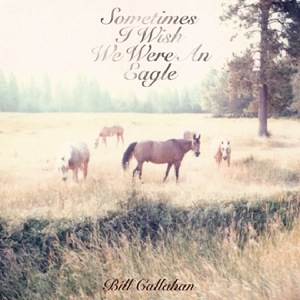
102
Bill Callahan
Sometimes I Wish We Were An Eagle
[Drag City; 2009]
It was around the time that he passed 40 years of age that Bill Callahan stopped using his nom de plume Smog and went by his birth name as a recording artist. Maybe it’s because he’d softened a little and started to be less snarky, appreciating the beauty of life. His second album under his own name Sometimes I Wish We Were An Eagle is certainly packed with beauty, but there’s a darkness hovering over the lyrics, expressed and rendered unlike any way Callahan had done before. The album comes sweeping in on an autumnal guitar line and a breezy set of strings (that characterize the album) and he opens with the line “I started out in search of ordinary things,” which is what he does throughout the album; talks about ordinary every day natural things, but in such a way that he sees the death and the beauty in all of them. Take the very next line for example: “How much of a tree bends in the wind?” The album goes on to discuss loss through examining the relationship of “The Wind and The Dove,” overcrowding of the mind with thoughts as blackbirds in “Too Many Birds,” anxiety and self-doubt where “All Thoughts Are Prey To Some Beast,” a dedication to a lost friend (possibly a horse) on “My Friend,” and ends up on the closing “Faith/Void” by deciding that “it’s time to put God away.” This is a very light scraping of the brilliant and beautiful themes that populate this album, and combined with the equally majestic and simple orchestral sweeps it’s an album that will be returned to time and time again.
– Rob Hakimian

101
The National
Trouble Will Find Me
[4AD; 2013]
You’d be hard-pressed to find a more universally acclaimed band in the ‘indie’ world over the past couple of years than The National. Of course, you’d be hard-pressed to find a better band as well. Since the release of their self-titled debut LP in 20011, or rather the Cherry Tree EP from 2003, the band has hammered on their own musical niche and while there’s been a few hopefuls no one has even come close to competing with them.
On this year’s Trouble Will Find Me, their sixth LP and the follow-up to 2010’s High Violet, The National are exactly where we’re expecting them to be. Vocalist Matt Berninger is still chronicling the darker side of urban life, with the Dessner twins writing some of the most affecting music around, all backed by one of the tightest rhythm sections around. The National aren’t exactly pushing the edges but they’re at a level where it doesn’t matter – it’s just so good.
– Johan Alm

100
Holy Other
Held
[Tri Angle; 2012]
Pulling from the occult-influenced musical stylings of electronic artists such as Salem and oOoOO and meshing it with the nocturnal slither of artists such as Burial, Holy Other’s Held is a work that is often times as horrific as it is sexual – the perfect soundtrack to a 3 a.m. crawl through downtown boulevards, between bedroom sheets, or in the midst of a seemingly never-ending comedown. Held succeeds by haunting its listeners as often as it seduces them – simultaneously pulling from sounds both inviting and unsettling. Out of the many peers Holy Other shares this burgeoning musical identity with, what makes Held stand out is how precisely and fluidly it captures this contrasting musical atmosphere. Much like the man behind the music, Held is an electronic work often hidden in shadow – masked by a thick fog of ambience that often causes the intricacies within each track to become blurred. It’s a hypnotic experience; so much so that one may often wonder whether specific sounds within the album are real or imagined. Like a spectral force, it plays tricks on you, and is unrelenting in its journey to do so.
– Cole Zercoe
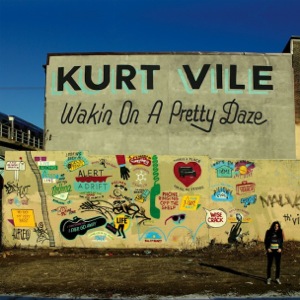
99
Kurt Vile
Wakin On A Pretty Daze
[Matador; 2013]
After a number of albums of scuzzy garage rock, Kurt Vile essentially became KV 2.0 in 2011 with Smoke Ring For My Halo, which peeled away the feedback and fuzz to reveal the songwriter that had been lurking underneath the whole time. The follow up, Wakin On A Pretty Daze finds Kurt becoming even more comfortable in this new approach, his hippy-like long hair and bare feet are now stretched out languidly in the sun and he’s stretching songs beyond the five minute mark with ease. “Making music is easy: watch me!” he proclaims on “Was All Talk,” while on “Goldtone” he talks about “get[ting] into [his] zone” which he seems to be in for the whole of this album’s 70 minutes. It’s not all sunshine; the mid-album trio of “Pure Pain,” “Too Hard” and “Shame Chamber” show him in a more contemplative mood, and the thoughtfulness that goes into all his other songs is here too, though cast in a different light. The layers of guitars that characterized his earlier output are still maintained, but refined, which makes this marathon of an album engrossing and rich, but never tiring.
– Rob Hakimian
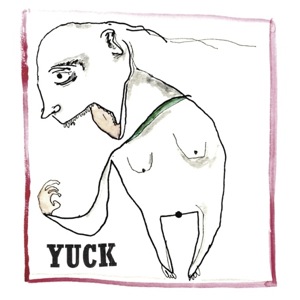
98
Yuck
Yuck
[Fat Possum; 2011]
Yuck was originally formed back in 2009 out of the ashes of the XL signed indie pop act Cajun Dance Party by Daniel Blumberg and Max Bloom. After releasing a couple of singles in 2010 the band delivered their self-titled debut LP in early 2011, on which they perfected the nineties indebted indie rock of their early singles. Led by Blumberg’s vocals and the Blumberg/Bloom twin guitars Yuck is by all accounts a child of its influences; there’s so many Pavement and Dinosaur Jr. references going around it’s almost ridiculous.
While the “nineties revival” feeling might be the first impression there’s a lot more going on and to dismiss the record because of it would be to do yourself a huge disfavor – the songs are good enough that they could be played through any genre filter and come out brilliantly. Even more impressive is the fact that the deluxe version adds six more tracks, all on the same level as the rest of the album. While Yuck ended up being the only record from the band as a four-piece – Blumberg left in early 2013 to pursue a solo career as Hebronix – it’s one that deserves being remembered.
– Johan Alm
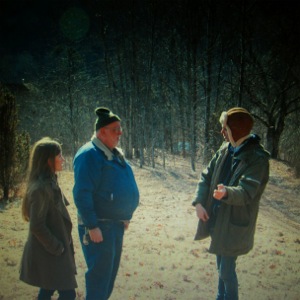
97
Dirty Projectors
Swing Lo Magellan
[Domino; 2012]
The Dirty Projectors carved out a space as one of indie-rock’s most innovative acts. After soaring above the din of the indie-stratosphere with 2009’s Bitte Orca, the band returned in 2012 with Swing Lo Magellan, a simpler-sounding record that digs deeper by scaling back. Where Bitte Orca refracted leadman David Longstreth’s avant-garde vision through a prism of bright, brash art-rock, Swing Lo instead whittles away at their Pollockian production and sometimes distracting dissonance, in favor of more direct, distilling discussions.
Recorded in a remote town in rural New York, the group relaxes and unearths beautiful, groovy songs with direct lyrics about love, identity (“Offspring Are Blank”), environmentalism (“Just From Chevron”), and existentialism (“Impregnable Question”). They’re clearly having fun as just about everything on Swing Lo is delightfully less-refined. We hear throat-clearings, laughter, and even off-mic chatter, opting for authenticity instead of over-production. But it’s still a Dirty Projectors record. Which means we still get healthy spoonfuls of vibrant harmonies, gnarly guitar solos, and of course, Longstreth’s colorful croon. This unique mix of sincerity paired with their left-of-center perspective results in an album that feels unabashedly pure and wholly unique – or put more simply, a fantastic record.
– Brian Hodge
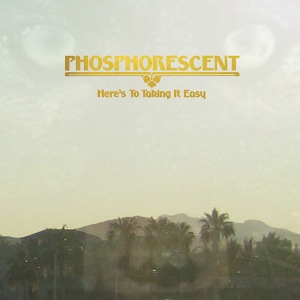
96
Phosphorescent
Here’s To Taking It Easy
[Dead Oceans; 2010]
Each album released by Phosphorescent seems to be drawn from a different aspect of frontman Matthew Houck’s psyche. On Pride, he channeled dense anti-folk sentiments, while To Willie was a love letter to country legend Willie Nelson. And on Here’s To Taking It Easy, Houck shares songs of loss, heartache, and possible redemption – filtered through a rural, backroads perspective. It’s a heartbreaking examination of our own fallible moral center, dressed up in country rags. The rending “The Mermaid Parade” stands as the centerpiece of the album, with its detailed narrative of the whirlwind romance and eventual collapse of a marriage. And though the album is bleak in parts, it never becomes maudlin – tracks like “It’s Hard To Be Humble (When You’re From Alabama)” and “I Don’t Care If There’s Cursing” see to that. Houck displays a preternatural ability to wring honest emotion from well-mined genre tropes and injects a welcome boost of clarity to his bucolic stories.
– Josh Pickard
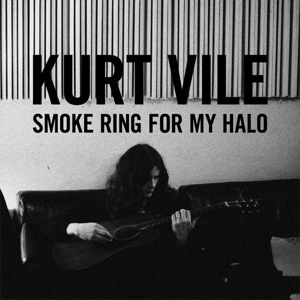
95
Kurt Vile
Smoke Ring For My Halo
[Matador; 2011]
The sound of a perennial nearly man finding his voice in the most richly rewarding way possible, offering forth a minor masterpiece of modern Americana. More compact than the also excellent Wakin On A Pretty Daze, it boasts less obvious standouts than the bookends of that record, but flows better and is hardly wanting for moments of sheer bliss. The liquid fretwork and homespun glory of tracks like the shimmering “Jesus Fever” lure you in first, before an admiration for the wig-outs develops as you fall deeper for Smoke Ring‘s charms. Even then, cuts such as “In My Time” only ever break loose in a very polite manner. More often than not Kurt finds a gold tone and rides it out, draping his words around the track as the mood takes him. Drawling about his couch could be misconstrued by some as stoner flippancy, were it not for Kurt’s innately relatable personality. Much like Odelay and Yankee Hotel Foxtrot before it, this is a sumptuous late afternoon record, wise beyond its years; restrained but powerful, gently carrying on its shoulders the weight of everything and nothing at once. He is Philadelphia’s new hero, and a wholly deserved one at that. Really, the sole KV crime here is that we’ve lowballed it.
– Gabriel Szatan

94
Cloud Nothings
Attack On Memory
[Carpark; 2012]
Attack On Memory’s bald-faced ferocity was an affirmation of what some of us had suspected all along: Cloud Nothings’ frontman Dylan Baldi was really a venomous rocker masquerading as a power popper. The revivalism of his first album with a full backing band tips its cap to the emo genii of the ’90s while planting its feet squarely in the modern indie area, thanks in no small part to Steve Albini’s polished production. Cloud Nothings don’t skip a single step when it comes to nurturing their inspirations, from the melodic post-punk chime of “Stay Useless” and the nightmarish 9-minute juggernaut “Wasted Days.” Attack On Memory a passionate, violent manifesto, and Baldi & co. play like their lives depend on it.
– Brendan Frank
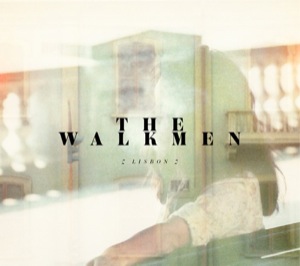
93
The Walkmen
Lisbon
[Fat Possum; 2010]
When most people were lost in nostalgia for a time they could hardly remember, The Walkmen took it a step further to the youth of their parents. What they created is a rich ode to dusty roads and sock-hops, even using vintage instruments to create the maximum affect. With two masterpieces already under their belts – Bows and Arrows and You and Me—Lisbon falls short of their accomplishment but still feels completely successful.The highlighs here — “Victory,” “Angela Surf City” and “Stranded” –are comfortably up there with The Walkmen’s best tunes, but “Lisbon” is their better as a whole, highlighting the band’s ability to create focused albums of consistent sound that change distinctly from album to album. They are vacations, temporary beauties, polaroids of the band at that specific point.
– Philip Cosores
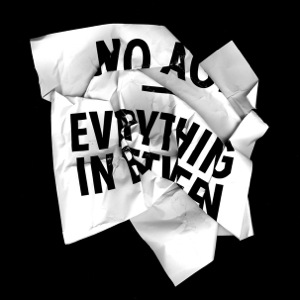
92
No Age
Everything In Between
[Sub Pop; 2010]
Before 2010, No Age weren’t exactly known for their subtlety. They still aren’t, but Everything in Between is the leanest collection of songs they’ve ever compiled. The duo have balanced out their more rambunctious propensities with a more mature approach to their songwriting. The noise seems more meticulous, more mapped out. Their musicianship is still anchored by lambasted riffs, acidic feedback loops and lockstep drum work, but there’s now a quiet sense of perspective entrenched in the music. Sputtering out trashy anthems about stepping out from the protective shell of your youth, the album magnifies the moments where there’s nothing but opportunity and the knock-around attitude that comes with the right level of desperation. Moving into adulthood isn’t always as easy or enjoyable as we’re made to believe, and it’s exciting to hear a band start to figure things out for themselves.
– Brendan Frank
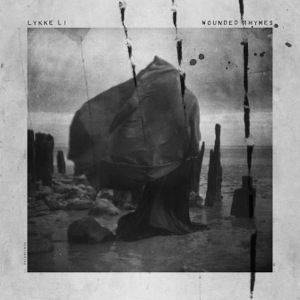
91
Lykke Li
Wounded Rhymes
[LL; 2011]
It may not be the best, but I’ll be damned, Wounded Rhymes may well be my favorite album of the decade. As a college kid, Youth Novels was the perfect soundtrack for the giddy bustling of sophomore year. As a recent graduate at its time of release, Wounded Rhymes absolutely dwarfed the relative childishness that record. Or perhaps it was too perfectly suited for my place in life: I had found a musical kindred spirit, aging in sync. The stark darkness of the album was nearly smothering, glimpses of idealistic hope squeezed amidst the reality of existence. I challenge you to find songs more blissful than “I Follow Rivers” and “I Know Places” – it’s a weighty demand – and then it all comes crashing down with “Silent My Song.” We’ve heard romantic woes god knows how many times, but Lykke Li finds the hopeless pointlessness of that unrequited love better than perhaps anyone.
– Chase McMullen

